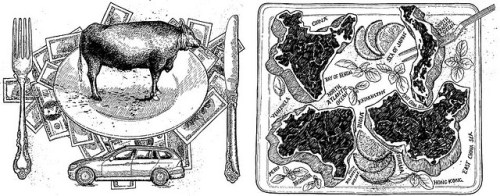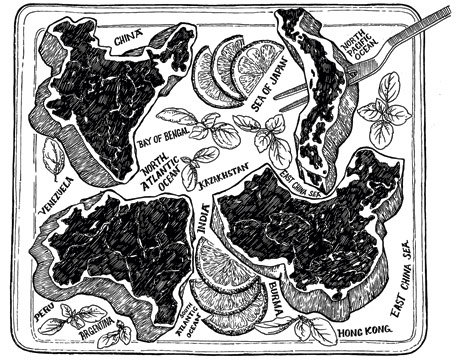The Globalization of Steak
Esquire |


By PARAG KHANNA
As global demand for steak rises, the stability of steak prices won't last for long. Parag Khanna on the geopolitics behind the official entrée of the twenty-first century.
As food and grain prices rise around the world, causing hunger and political unrest from Egypt to Indonesia, I still find myself nearly every weekend walking around the corner for brunch to Brasserie Les Halles in Manhattan, where the steak frites is $17.50. Steak has been stable not just in its price, but also its gastric and emotional effect: Afterward I am both full and full of myself. It first struck me in Shanghai at the tail end of two years of traveling the world on a lean budget to research a book. Deng Xiaoping was only partially right: To get rich is glorious, but to flaunt it over a steak even more so. In pig-obsessed China, a harsh winter led to pork shortages that have elevated Brazilian beef's already exotic appeal to the prospering masses. China's far-wealthier rivals the Japanese once had the lock on high-quality Kobe, but globalization has brought even South America's finest export to the Far East. "We can't afford the massaging and beer for our cows," a Brazilian TV journalist told me recently. "And we won't pay a hundred bucks for a steak anyway. It's our national right to eat an affordable steak." How could such egalitarianism not play well in communist China? Even in my native India--where I, incidentally, would never eat steak--I've been mildly shocked to see beef popping up on the menus of chic cafés, even outside the more Muslim-populated areas of Mumbai or French-inflected Pondicherry, where even Indian tourists dig in with serrated knives. The globalization of steak's status has turned what was once a covert and guilty pleasure--and one Indians like me could only comfortably enjoy outside the motherland--into a brash statement of secular elitism. But as with the automobile, the tragedy of the commons looms not far beyond the horizon. Rising Asian demand for beef has led to Amazonian slash-and-burning to create more grazing room for cattle, keeping the price of steak within reach while global temperatures rise. Enjoy it while you can.